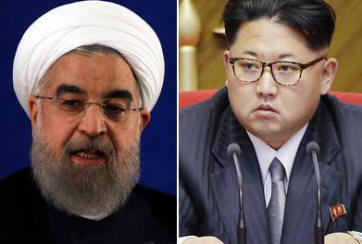
The Great Smoky Mountain Journal
Staff Reports
Posted: Monday, January 01, 2018 12:30 PM
WORLD: Iran, North Korea Launch Rockets On Back-To-Back Days; N. Korea Fires Rocket Towards Japan
The two remaining members of the "Axis
of Evil" launched rockets on back-to-back days, with Iran and North
Korea blatantly flouting international resolve as each took significant
steps toward developing their own nuclear-tipped intercontinental
ballistic missiles.
North Korea on Friday for the second time this month successfully
launched an ICBM into space and had its re-entry vehicle splash down.
Friday's rocket landed in the Sea of Japan, about 600 miles from the
launch pad; however, U.S. officials were still assessing the missile's
apex, which more accurately determines how far away the rocket could
strike.
On Thursday, Iran launched its own rocket -- based off a North Korean
design -- towards space. The Islamic Republic said the launch was a
success, but U.S. assessments pegged the Iranian posture as propaganda.
Officials believe the Iranian rocket suffered a "catastrophic failure"
and likely blew up.
Neither missile posed an imminent threat to North America, however, the
North Korea launch drew a swift response from the Pentagon.
"Our commitment to the defense of our allies, including the Republic of
Korea and Japan, in the face of these threats, remains ironclad,"
spokesman Capt. Jeff Davis said. "We remain prepared to defend ourselves
and our allies from any attack or provocation."
While North Korea is actively and openly engaged in trying to perfect
its ICBM technology so the rocket could one day be topped with a nuke
and potentially launched at foes around the globe, Iran's program is far
more secretive.
Following the landmark Iran nuke deal signed two years ago and
championed by the Obama administration, Iran's development of a nuclear
bomb was believed to have been pushed back significantly. But officials
believe Thursday's launch of a space vehicle carrying a satellite
payload was merely a test of technology that could be easily adapted to
an ICBM.
The Trump administration, which has railed against the Obama-brokered
nuclear deal, moved on Friday to impose additional sanctions on Iran due
to the -- ultimately unsuccessful -- rocket test.
Treasury Secretary Steven Mnuchin said the sanctions illustrated deep
U.S. concerns about Iran’s missile testing and other actions. He said
the U.S. would continue countering Iran’s ballistic missile program --
including the “provocative space launch.”
The U.S. has said the launch flouted a United Nations Security Council
resolution because the technology is inherently designed to be able to
carry a nuclear payload.
The North Korean launch had been expected by U.S. analysts, who
initially believed the launch date would be Thursday -- the 64th
anniversary of the signing of the armistice that ended fighting in the
Korean war. But bad weather apparently scuttled the launch and it was
moved back one day.
Fox News' Lucas Tomlinson and The Associated Press contributed to this
report.
